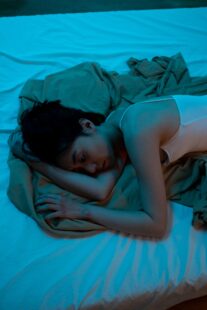12 Things That Can Make Anxiety Worse
Nathan Ainley
 When we feel anxious, it is normal to seek comfort. This can look different for each of us. Some people seek comfort in life-giving, helpful things like prayer, healthy relationships, and counseling. Sometimes, however, we seek comfort in ways that are not as beneficial.
When we feel anxious, it is normal to seek comfort. This can look different for each of us. Some people seek comfort in life-giving, helpful things like prayer, healthy relationships, and counseling. Sometimes, however, we seek comfort in ways that are not as beneficial.
Often, the things we seek comfort in when we feel anxious are things that feel good at the time. They are things that can seem innocent and benign as if they won’t pose any additional risk or harm. Unfortunately, these things can prevent our anxiety from getting better or even make it worse.
Things that increase anxiety.
It is important to consider what you are doing to comfort yourself when you feel anxious. These twelve things may not appear to be a problem but, over time, they can make your anxiety worse.
Caffeine.
When you feel anxious, it is common to feel tired. This can be more than physical fatigue. When you entertain anxious thoughts, it can be mentally and emotionally draining, leaving you feeling exhausted.
Many times, when we are tired, one of the first things we do is reach for coffee or another caffeinated beverage to help us. This is socially acceptable and even expected. Unfortunately, caffeine can make things worse.
Caffeine is a stimulant – and that can be bad news for someone with anxiety. Caffeine’s jittery effects on your body are similar to those of a frightening event. That’s because caffeine stimulates your “fight or flight” response, according to a 2006 study, and research from 2018 has shown that this can make anxiety worse and can even trigger an anxiety attack. – Chris Iliades, MD
Lack of sleep.
If you’re feeling so anxious and weary, the logical answer is to get some sleep. If only it were that easy.
People struggling with anxiety can have trouble sleeping. This can be due to the mental overwhelm they are feeling, ideas swirling in their brain, or just a physical inability to sleep. Anxious people may also be tempted to skip sleep, trying to work harder to fix whatever problems they are facing.
Sleep, however, is an important part of healthy physical and mental well-being. If you miss sleep, for any reason, it can heighten your anxiety.
Decreased physical movement.
Some people who feel anxious want to avoid everything. This can mean things as basic as getting out of bed or leaving the house. Sedentary living may sound like a relaxing comfort initially, but your body needs movement.
Decreasing your exercise or general movement can make your anxiety worse. “One of the most frequently cited reasons for anxiety is unused energy. Your body was made to move, and unfortunately when it doesn’t move it creates tension.” (Micah Abraham, BSc) Additionally, hormone levels and immune system imbalance are all connected to a lack of movement and increased anxiety.
Alcohol.
 Having a drink to calm down is common practice, but that doesn’t mean it is helpful. When you are struggling with anxious thoughts or feelings, you may be inclined to use alcohol or other substances to help you calm down. People often think that a drink or two will take the edge off and make them feel better.
Having a drink to calm down is common practice, but that doesn’t mean it is helpful. When you are struggling with anxious thoughts or feelings, you may be inclined to use alcohol or other substances to help you calm down. People often think that a drink or two will take the edge off and make them feel better.
Alcohol functions as a depressant. While the drink may make you feel more relaxed, that feeling is temporary because alcohol has a relatively short-term effect on the body. When these effects wear off, people often find they are struggling with increased anxiety. Alcohol can also make people feel things with different intensities, making anxiety worse.
Skipping meals.
We all miss a meal here or there. But when you are feeling anxious, missing a meal can have a deeper impact.
The body needs appropriate fuel to function well. When you miss a meal, you miss an opportunity to fuel your body. This not only affects your physical body but things like hormone levels and mental functioning. Missing a meal can increase your anxiety because your body is out of balance.
Excess sugar.
Just as some people seek out caffeine when they are anxious, others seek sugar. Sugary foods are often comforting, providing an immediate sense of relief when consumed. Unfortunately, they can make things worse.
Sugar and anxiety are connected, with sugar making your anxiety symptoms worse by affecting the stability of your blood sugar levels and interfering in the production of BDNF. Sugar disrupts the body’s natural physiology, and one of the consequences is anxiety and even panic attacks. – Tanya J. Peterson
A messy environment.
 When you are anxious, the last thing you may care about is how neat your room or house is. Things like making the bed, cleaning up after yourself, or clearing the table seem insignificant compared to the anxiety you are experiencing.
When you are anxious, the last thing you may care about is how neat your room or house is. Things like making the bed, cleaning up after yourself, or clearing the table seem insignificant compared to the anxiety you are experiencing.
Messy spaces are more than just an inconvenience or an eyesore. Messy spaces can increase levels of anxiety. A messy room or space creates additional visual stimulus you don’t need when you are anxious, makes it difficult to relax, fosters feelings like guilt and shame, and can make everyday functions feel more difficult.
Saying yes to everything.
When people ask for help, it can be tempting to say yes for a variety of reasons. When you say yes too frequently, however, it can put increased pressure on you and cause your anxiety to get worse.
Every time you say yes to doing something, it adds to your responsibilities. When you are struggling with anxiety, you cannot afford to add responsibility.
Being around negative people.
Most of us don’t intentionally seek out time with negative people, but that doesn’t mean we don’t end up around some negative people. The people you spend time with affect how you think and feel. That’s why it is so important to consider whom you spend time with wisely.
Lack of water.
Water may sound so simple you are tempted to skip this, but it is incredibly important. Your body needs water to function well. Just as it needs rest, movement, and healthy foods, it requires water.
This isn’t about trying not to be thirsty. A lack of water can increase tension physically in your body. This tension can fuel any anxious feelings with which you are struggling.
Not getting outside.
When you avoid time outside, you miss natural things that can decrease anxiety. Fresh air, sunshine, and changes in scenery are all beneficial. When you avoid these things by staying inside, your anxiety can get worse. For some, this can spiral into serious medical problems.
Too much time online.
It may feel impossible to think about living life with the connectedness of online life. When you spend too much time online, however, it can affect your anxiety.
Time online can decrease the amount of time you spend in real-life relationships, impact your self-esteem, and affect your work. These are just a few examples of the impact of online time. Additionally, time online can lead to addictions, gambling, and detachment from healthy connections in your life.
Christian counseling for when you’re feeling anxious.
 If you are struggling with anxiety, you are not alone. Whether you identify with one of these things or the whole list, the counselors in our office are here to help. We can help you understand your anxiety and develop strategies for navigating it healthily.
If you are struggling with anxiety, you are not alone. Whether you identify with one of these things or the whole list, the counselors in our office are here to help. We can help you understand your anxiety and develop strategies for navigating it healthily.
You don’t have to keep doing things that make your anxiety worse. The Christian counselors in our office will talk with you, pray with you, and help you develop a way to live your life with less anxiety. Reach out to our office today to get started.
Sources:https://www.everydayhealth.com/anxiety-pictures/7-surprising-causes-of-anxiety.aspx
https://www.calmclinic.com/anxiety/treatment/exercising
https://www.healthyplace.com/anxiety/food-and-anxiety/sugar-and-anxiety-how-sugar-can-make-your-anxiety-symptoms-worse
Photos:
“Cappuccino”, Courtesy of Chevanon Photography, Pexels.com, CC0 License; “Messy Room”, Courtesy of Igor Starkov, Pexels.com, CC0 License; “Naptime”, Courtesy of cottonbro studio, Pexels.com, CC0 License; “Hacker”, Courtesy of Sora Shimazaki, Pexels.com, CC0 License






